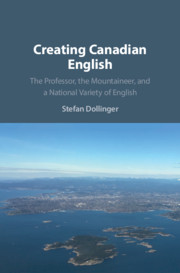Book contents
- Creating Canadian English
- Frontispiece
- Creating Canadian English
- Copyright page
- Dedication
- Contents
- Figures
- Tables
- Preface
- Acknowledgements
- A Note to the International Reader
- 1 What is Canadian English?
- 2 The Heritage of Canadian English
- 3 Avis Pulls It Off
- 4 The “Technology”: Slips, Slips, and More Slips
- 5 1967 – Excitement and Hype
- 6 Riding the Wave of Success
- 7 A Global Village and a National Dictionary War
- 8 Decolonizing DCHP-1 and DCHP-2
- 9 Is There Really a Canadian English?
- Notes
- Further Reading
- Bibliography
- General Index
2 - The Heritage of Canadian English
Published online by Cambridge University Press: 24 June 2019
- Creating Canadian English
- Frontispiece
- Creating Canadian English
- Copyright page
- Dedication
- Contents
- Figures
- Tables
- Preface
- Acknowledgements
- A Note to the International Reader
- 1 What is Canadian English?
- 2 The Heritage of Canadian English
- 3 Avis Pulls It Off
- 4 The “Technology”: Slips, Slips, and More Slips
- 5 1967 – Excitement and Hype
- 6 Riding the Wave of Success
- 7 A Global Village and a National Dictionary War
- 8 Decolonizing DCHP-1 and DCHP-2
- 9 Is There Really a Canadian English?
- Notes
- Further Reading
- Bibliography
- General Index
Summary
This chapter traces the contributions of the two key scholars, Charles Julien Lovell and Walter Spencer Avis, towards the making of Canadian English. Both are either unknown or, at best, opaque figures in today's linguistic circles, yet their contributions have far outlived them. Lovell, the American autodidact with nothing more than a high-school degree to his name, and Avis, Ph.D.-trained linguist and towering figure in Canadian linguistics, had very different levels of formal training, yet shared the same vision, passion, and drive to "create" Canadian English with a series of dictionaries. This series, the "Dictionary of Canadian English" was begun by Lovell and was, after his fatal heart attack at the age of 52, carried on and seen to completion by Avis. The chapter details the early planning stages of the dictionary series, building from the correspondence between Avis and Lovell and others, with special emphasis on A Dictionary of Canadianisms on Historical Principles, the flagship dictionary. The chapter highlights the women involved in linguistics at the time, such as Helen Munroe, Joan Hall, and Faith Hutchison Avis, who, often if not always in underprivileged roles, played important and often thankless parts in the birthing process of Canadian English.
Keywords
- Type
- Chapter
- Information
- Creating Canadian EnglishThe Professor, the Mountaineer, and a National Variety of English, pp. 34 - 63Publisher: Cambridge University PressPrint publication year: 2019



